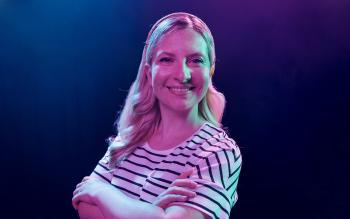Lead paragraph
The students and personnel the greatest asset of our higher education community. The driving factors behind the realisation of our strategy are the enthusiasm and competence of students and personnel. As a responsible employer, we take care of our personnel and their competence development.
In 2022, we deployed the strategy to the daily operations and learned on the job. The reforms implemented together enabled us to progress towards a more dynamic and community-oriented operating culture. We progressed in the implementation of the education reform, and prepared for the international audit by the Finnish Education Evaluation Centre.
We conducted an on-going dialogue in our higher education community and developed internal communications by renewing our intranet. We strengthened the functioning of our organisation by centralising the majority of our personnel to the new Competence responsibility area. Our success in RDI project applications increased our number of personnel. We implemented researcher roles to support individuals’ career paths in researcher tasks and the achievement of our organisations’ RDI objectives.
An interesting employer
We offered several of our talents (76 people) motivating development opportunities through internal mobility as well. A record number of our talents (25 people) retired during the year of operation. On one hand, this called for a controlled transfer of competence and, on the other, enabled us to renew our competence structure with regard to the strategic objectives.
Although the competition for talented people is becoming tighter, we are considered to be an interesting employer. We succeeded in recruiting talents matching the target profiles to all of our open positions. We strengthened the diversity of our competence structure with regard to international talents, in particular.
We listened to personnel feedback when we renewed our practices concerning multi-location work. The location where work is performed, on campus or remotely, is determined by which location is the most appropriate for the work in question. The multi-location model of work, which has received extensive praise, is based on encounters on campus, shared policies that ensure smooth performance of work, and the groups’ ground rules. The model emphasises flexibility, trust and a community spirit.
A responsible work community
We carried out workplace surveys on all campuses. The surveys identified resources that serve as buffers against the impact of stress factors. Our key resources are good opportunities to impact one’s own work, a work community of pleasant and competent colleagues, and an opportunity to apply one’s own competence in meaningful tasks. As development measures, we implemented coaching to support returning to working together after the pandemic. The key themes included the promotion of interaction, psychological skills and preparedness to handle conflict situations. With regard to physical ergonomics, we conducted checks on employees’ workstations.
We updated our Responsible Haaga-Helia model. The four areas of the model – Happy, Degree, Developing and Green Haaga-Helia – realise our extensive responsible operations. The objectives and measures of the Equality Plan have been a recurring theme in the meetings of the labour protection committee since the end of 2021. During the year, more than 40 measures were taken to meet the objectives, such as equality training sessions from the perspective of both pedagogy and multicultural cooperation. We strengthened the dialogue between several parties in labour protection by inviting the Executive Director of the student union Helga to the labour protection committee.
Renewing and competent personnel
In the development of the work community and competence, we focused on change management and continuous dialogue. In addition, the competence development of employees in supervisor roles highlighted knowledge-based management, the management of competence, and capacity for work. We strengthened pedagogical competence by developing guidance and conducting the PedaComp survey, or development measured in accordance with the self-assessment of the faculty.
In RDI competence, we strengthened our preparedness to participate in consortia and to implement extensive international RDI projects and developed competence in scientific cooperation and in publishing. We developed our internationalisation preparedness by offering language and cultural training. In competence development, we emphasise learning on the job and from each other in both our higher education community and networks.
Highlight of 2022
At the end of the year, we celebrated the measures we took to gain visibility for our excellent accomplishments in our community. Personnel proposed groups as award recipients, and there were four award categories and four groups. The award for the pedagogical deed of the year was won by the TASECO accounting firm, the award for the RDI activity of the year went to the INCLAVI team, and the award for the social deed of the year was received by Pedaforum and its preparation group. Haaga-Helia’s communications, marketing and alumni activities received the community deed of the year award.

